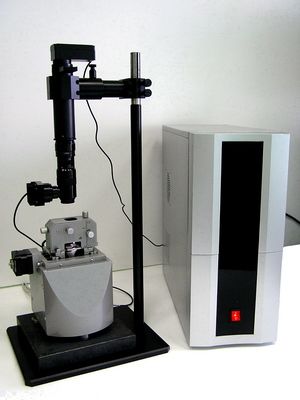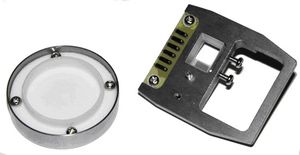Main Sector of relevance\IRC classification 5. Electronics, IT and Telecommunication
5.10 Nano diagnostic complex with scanning probe microscopy and optical microscopy functions


Developers’ contact information
State Scientific Institution “The A.V.Lykov Institute of Heat and Mass Transfer of National Academy of Sciences of Belarus”
15 P.Brovka Street, Minsk BY-220072
Tel.: +375 (17) 284-10-60, fax +375 (17) 292-25-13
Summary
Nano diagnostic complex with scanning probe and optical microscopy functions is an experimental facility adapted for biological cells research which includes nanometric resolution 3D visualization, determination of adhesive and viscoelastic properties with combined scanning probe and optical microscopy functions, micropositioning procedures and liquid cell operation.
Description
Nano diagnostic complex with scanning probe and optical
microscopy functions is designed for testing of polymer nano composites, thin
films and biological micro- and nano objects. The complex can be used for
fundamental and applied research in the sphere of microbiology, micromechanics,
thin-film technologies as well as nano- and biotechnologies to determine
physical and mechanical properties of various materials at micro- and nano
levels.
The complex belongs to the automated hardware class intended for visualization
and nanometric solution scanning probe of micro objects (including biological
cells) as well as analyzing local mechanical properties by indenting method.
Measurements for these parameters provide more reliable and complete
information on viscoelastic materials (polymers, biological tissues, cells and
organelles) as compared to other available atomic-force microscopes.
To ensure effective complex operation there was developed a guidance prompting
on determination procedures for material elasticity modulus, relaxation times,
viscosity, and mechanical loss tangent distance by means of nano indentation
technology.
The complex is of table-set design and unit structure. This design provides for
a convenience of operation and availability of all units and nodes in case they
should need adjusting or replacement within the complex service life.
Technology type
Technical advantages and economic benefits
Basic operating features of the complex are as follows:
Technology differentiation and uniqueness
A new technology.
Context in which technology was identified
Multiple Access Centre of Heat and Mass Exchange Institute named after A.V. Lykov, the National Academy of Sciences of Belarus.
Technological keywords
Nano diagnostics, scanning probe microscopy, cytomechanics, material science, adhesion, rheology, nano composites, thin films, biological cells.
Development Stage
Intellectual property rights
Range of applications
The research is possible for polymer nano composites, thin films
and biological micro- and nano objects.
Modern trends in micromechanics development (MMD), thin-film, nano and bio
technologies make the problem of characterization and micro- and nano level
analysis of physical and mechanical material properties even more urgent.
Adhesive behaviour and viscoelastic deformation processes in thin polymer
layers, including those within a wide temperature range, are apparently of
great interest, for example, for nano printing technologies. Viscoelastic and
frictional properties are important in functional nano coatings design for
high-precision friction knots. It also offers certain advantages for
biotechnologies on cell engineering level where cytomechanical problems play
the decisive part. The main difficulty of mechanical studies on individual
biological cells and organelles is connected with micro- and nano measurements
in biological solution with temperature and electrochemical conditions
control.
Scanning probe microscopes offer a wide range of nano and micro level analytic
functions for physical and mechanical material properties. However,
atomic-force microscopes available cannot give reliable and complete
information on viscoelastic materials (polymers, biological tissues) with
properties largely dependant on relations between relaxation period duration,
testing time intervals and ambient temperature values. According to the
well-known theoretical evidence, enough information on viscoelastic materials
behaviour can be derived from the following parameter set: material elasticity
modulus in balanced state; relaxation period (for polymers in the area of λ
transitions); viscosity; material mechanical losses tangent in balanced
state.
It is possible to determine the parameters on the basis of a complex providing
for both static and dynamic loading with proper methods for registration. Due
to the above fact development of a complex for testing polymer nano composites,
thin films and biological micro and nano objects as well as a suitable guidance
is rather urgent and important in terms of its application.
Classifier Used at the EU Innovation Relay Centres
Preferable Regions
Practical experience
The technology has been introduced and is implemented.
Environmental impact
No significant impact on environment.
Type of collaboration sought
Terms and restrictions
—
Available technical assistance